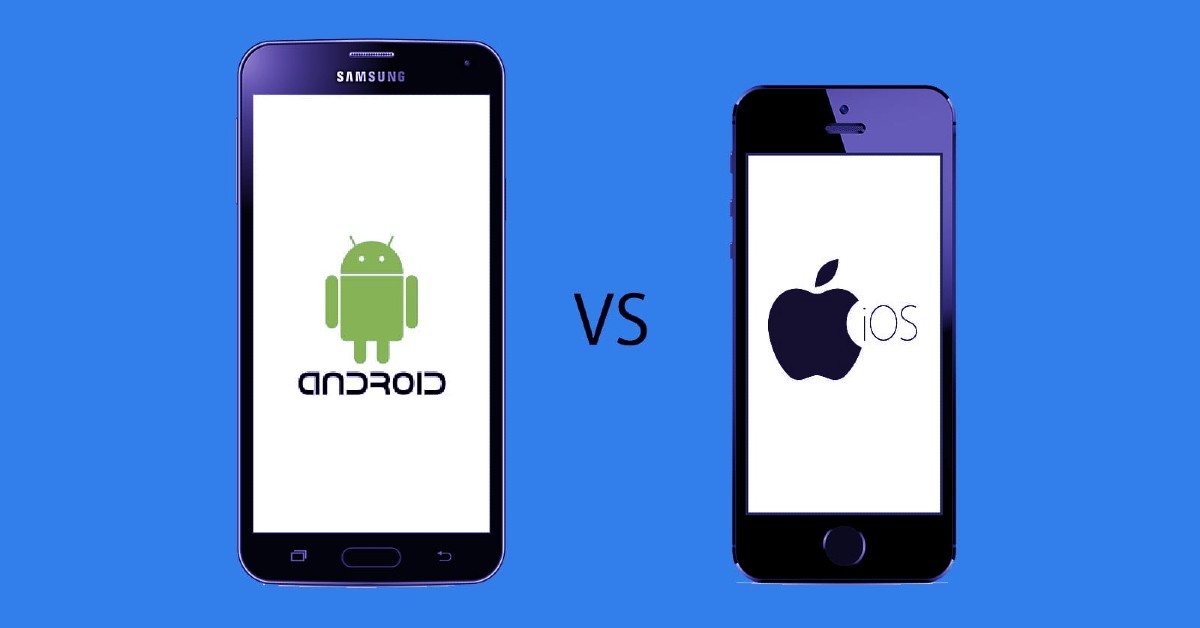I recently found research where they stated that smartphone users from around the world have increased to a staggering 6.25 billion. That’s almost 90% of the world’s population! The numbers just don’t stop there but they are growing by millions with each passing year. Sooner than we know, we will come to a point where every other person in the world will own a smartphone, an ecosystem powered by devices run either on Android or iOS. Now, you must be wondering why I am talking about these two alone.
Well, that’s because these two platforms are taking the lion’s share. According to statistics, almost 71-73% of smartphone users have mobile devices which are dependent on & powered by Android. Whereas, around 27-29% of the market share belongs to the iOS platform. With such numbers, an entrepreneur can easily feel overwhelmed and may struggle to answer the most obvious, which platform should they choose for their next-generation mobile app solution. Are you a business owner or an entrepreneur looking to invest in building or launching a mobile app?
Android vs iOS which platform is the best for creating a mobile app?
Let us help you decide for the better.
5 Factors to Consider When Choosing a Platform for a Mobile App
Market Share
Believe it or not, Android takes the lion’s share when it comes to the smartphone market. With more than 70.1% of the share, there are plenty of options available for users to choose from. Indeed, we expect the Android ecosystem to eventually grow more with better AI-powered entrants hitting the market, but recently, we have also seen a surge in the iOS market share just as much. iOS has exponentially grown this year reaching an alarming 29.2% slowly taking up more space in the mobility platform market.
The high market value of Android smartphones might just be one of the many reasons. With Android phones starting at a price as low as $99, we can expect this market to tremendously grow over the coming days. Meanwhile, iOS stands undisputed when it comes to class, quality & security. However, these phones start at $599 and go up to $1,599. With more than three billion active users, the Android market share covers a wider audience compared to iOS, which takes the winning position.
User Demographics
If there’s one other thing that plays an important role in choosing the best platform, especially for building a next-gen mobile app, it’s considering user demographics. Compared to Android, iPhone users most likely earn 40% higher income compared to Android users. Besides, it has also been found that Android users are expected to spend 7 times more money on Android-powered apps just as much. Based on the economics, Apple users have seen more engagement. They are observed to spend nine more hours of screen time every month, which is more than what an average Android user does.
It was also found that Android users were more prevalent in the lower and middle-income groups. In the United States alone, the household incomes of Android users were usually found below $50,000 on an annual basis. Whereas, for iPhone users, the average income was around $100,000 or more. Most Android users fall among older age groups, people particularly over 45 years; whereas, iOS users usually fall in the category of 18-35 years. The 18-24 group is the largest demographic for iOS users.
Your target market plays a major role; based on where your average audience is present, you choose the right platform to build your app.
Development Cost
When choosing between Android and iOS for your mobile app development cost is an important factor to consider. Custom Android app development can often require a higher budget due to the platform’s extensive device fragmentation.
With over 24,000 unique devices running Android, developers must account for varying screen sizes, hardware configurations, and OS versions, which can drive up testing and optimization costs.
On the other hand, iOS development tends to be more streamlined, as Apple offers a limited range of devices like iPhones and iPads.
However, the upfront cost of developing an iOS app can be steeper due to the platform’s higher quality standards and security protocols.
In either case, your budget must reflect the complexities of the chosen platform. The route you take will decide how much you need to invest in a mobile app solution.
Geographical Location
Geographical location also plays a vital role in what app platform you choose to create your next-gen mobile app.
Android dominates markets in Asia, Africa, and South America, where lower-cost smartphones are more prevalent. Countries like India and Brazil see a larger Android user base, often due to affordability and local availability. Meanwhile, iOS holds a stronger position in regions like North America, Western Europe, and Australia, where higher-income users and premium devices are more common.
Depending on where your core user base resides, you should carefully evaluate which platform aligns with their preferences to ensure your app reaches the widest and most relevant audience.
Device Fragmentation
Device fragmentation refers to the range of devices supported by a particular mobile app platform.
For example, Android is powered by a variety of Original Equipment Manufacturers (OEMs), with hundreds of new smartphones released annually.
In 2023, there were over 24,000 distinct Android device models globally, contributing to its high level of fragmentation. This vast ecosystem means app developers must account for different screen sizes, hardware specs, and software versions, making optimization more complex.
On the other hand, iOS is exclusive to Apple products, resulting in lowering device fragmentation. As of 2023, a custom mobile application development company reports Apple had just 20 active iPhone models.
Both the hardware and software integration on iOS make it easier to develop and optimize apps, reduce the potential for bugs, or remove compatibility issues.
When you’re choosing the right platform for your mobile app, make sure that you assess whether the platform has high fragmentation or not.
Android’s large range of devices requires continuous testing and optimization, while iOS’s limited ecosystem offers a more consistent experience.
Concluding Thoughts
Deciding whether you want to use Android or iOS for your mobile app depends on a number of factors. Each of them has their own set of benefits and experiences their own challenges.
Whether it’s the extensive market share of Android or the premium appeal of iOS, understanding your target audience, budget constraints, and geographical considerations is essential.
Both platforms come with their unique opportunities to reach different segments of the global population; however, the ultimate decision depends on the business goals & user demographics. With the digital world constantly evolving, it’s important to make an informed choice.
Let these insights guide your platform selection for the future.
Keep an eye for more news & updates on Gossips!




